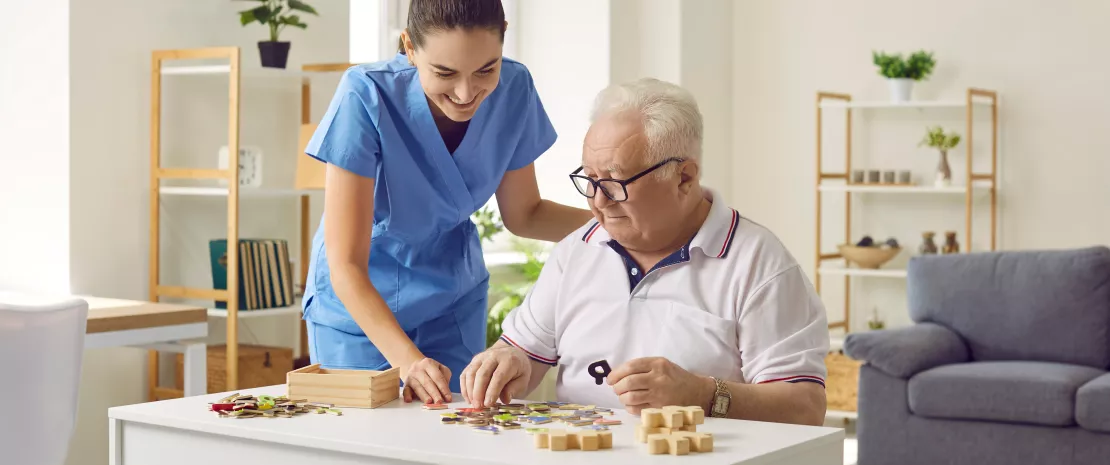Is the microbiota key to the early diagnosis of Alzheimer’s disease?
Even before patients show any clinical signs of Alzheimer’s disease, imbalances in their gut microbiota may betray its onset. Is it thus possible to detect the disease earlier?
- Learn all about microbiota
- Microbiota and related conditions
- Act on your microbiota
- Publications
- About the Institute
Healthcare professionals section
Find here your dedicated section
Sources
This article is based on scientific information

About this article
Alzheimer’s disease is progressive and silent. During the so-called pre-clinical phase, cognitive state appears normal. However, in-depth tests have already shown the progressive accumulation of two proteins in the brain, β-amyloid (Aβ) and tau proteins, which cause brain damage and a slow degeneration of neurons, beginning in the memory center and then spreading to the rest of the brain.
An interval of at least 10 years exists between the first deposition of Aβ plaques in the brain and the first clinical signs of impairment.
After this silent phase, the first symptoms of (sidenote: Dementia Brain disorders that affect memory, thinking, behavior, and emotions. Changes in mood and behavior sometimes precede memory problems. Symptoms worsen over time. Most sufferers eventually require assistance in their day-to-day life. Sources: OMS and Alzheimer’s Disease International ) appear. This is the clinical stage of Alzheimer’s disease, marked by mood and personality changes, memory lapses, forgetting certain words to the point of being difficult to understand, disorientation in space and time, leaving things in inappropriate places (keys in the fridge), etc.
More than 55 million people worldwide suffer from dementia.
60% to 70% of dementia cases are caused by Alzheimer’s disease.
Gut dysbiosis in pre-clinical Alzheimer’s disease
What role does the gut microbiota play in all this? We already know that in the clinical stage of the disease, patients have an unbalanced gut microbiota. According to a US study published in 2023, this imbalance also exists in the pre-clinical stage and is all the more pronounced the more β-amyloid proteins have accumulated. This imbalance in the gut microbial ecosystem (or dysbiosis) is not linked to diet: future Alzheimer’s patients who do not yet show any signs of dementia have a diet comparable to that of healthy patients who are not slowly succumbing to the disease.
75% of those surveyed were unaware that diseases such as Parkinson’s, Alzheimer’s, and autism may be linked to microbiota.
Can this help predict the subsequent clinical form of the disease?
The team identified gut bacteria that are generally over- or under-represented in the pre-clinical stage. These bacteria allowed them to use (sidenote: Machine Learning Automatic learning whereby artificial intelligence solves a task based on metagenomic and metabolomic data collected, in this case the identification of discriminating bacterial species. Wazid M, Das AK, Chamola V, et al. Uniting cyber security and machine learning: Advantages, challenges and future research. ICT Express, 2022; 8(3), 313-321. ) to improve their predictive models for Alzheimer’s disease. Admittedly, the gain is small when the initial model incorporates β-amyloid proteins, which are the main pre-clinical signature of Alzheimer’s disease. However, the latter requires lumbar punctures and brain neuroimaging, complex and uncommon procedures. When models are based solely on readily available data (age, sex, hypertension, family history, etc.), the addition of bacterial data from a stool sample improves model (sidenote: Sensitivity The sensitivity of a medical test measures its ability to correctly detect those suffering from a disease (identification of as many sufferers as possible). A sensitivity of close to 100% means the test has little chance of missing cases of a disease, i.e. few false negatives (few undetected true sufferers). Bertrand D, Fluss J, Billard C. Efficacité, sensibilité, spécificité : comparaison de différents tests de lecture. L’Année psychologique, 2010 ; 110, 299-320. ) by 6.8% and (sidenote: Specificity Specificity is the probability that the test will be negative knowing that the subject is healthy. It therefore measures a test’s ability to detect healthy individuals. The closer the specificity is to 1, the fewer the false positives. Bertrand D, Fluss J, Billard C. Efficacité, sensibilité, spécificité : comparaison de différents tests de lecture. L’Année psychologique, 2010 ; 110, 299-320. ) by 27.1%.
This makes it easier to pre-identify at-risk patients, who can then be prescribed more in-depth examinations. If bacteria are indeed the cause of these changes, which has yet to be confirmed, these results also suggest the possibility of modifying the gut microbiota to limit the progression of Alzheimer’s disease.












